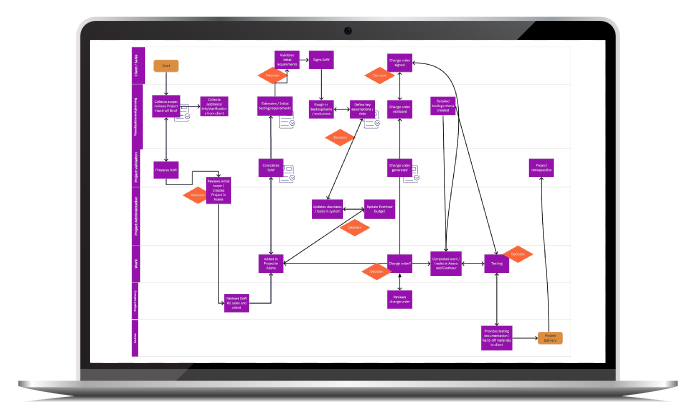DIGITAL TRANSFORMATION
PROJECTS FOR SMALL & MEDIUM BUSINESSES. DONE RIGHT.
As your business evolves and grows, digital transformation allows you to improve and automate your processes, practices, and workflows.
“Before Evolved Metrics, we captured project updates and created reports in stationary documents like Word, PDFs, various checklists, and templates. We didn’t have the ability to govern that number of documents, and wanted to work smarter, not harder. EM helped us digitize this work inside a system that runs smoothly and efficiently. It has cut down on the number of extra communications that need to happen to receive updates on projects in the field.”
Noelle Cameron, Manager – Project Management Office
1. We learn your processes.
We start by cataloging and analyzing your processes without regard to technology. By understanding what needs to be done, what changes over time, who needs to be told of changes, and what needs to be tracked and recorded in your business, we get a clear picture of how to make the biggest impact.
2. We review your technologies.
Next, we look at what technologies your business currently uses and build out RPA (robotic process automation), analytics, reporting, and processes wherever possible to ensure data retains its value to be used for analytic and improvement purposes.
3. Our team of PowerApps, BI, and automation experts go to work.
We work primarily in the Microsoft stack, which is available at a relatively low cost for any O365 subscribed company. If you are a Microsoft 365-based business, your license costs are likely to be very low. This also allows us to build projects on a flat-fee basis wherever possible, which means no surprise fees for you.

ACHIEVE MORE WITH LESS
Save time, money, and manpower on your processes. Digital transformation means fewer email chains, easy methods of sharing and updating information, high-level reporting and data-gathering, and clear lines of communication.
DEVELOP SMOOTHER PROCESSES
We have PowerApps, BI & and automation experts to transform your current processes into digital ones. We help uncover the gaps and bottlenecks that bog you down, determine how to better retain and use your data, and better archive your documents. Digital transformation means smoother processes.
ENJOY STRESS-FREE TEAMWORK
Our goal is to create systems and processes that ensure your data can be trended, compared, reported, and analyzed holistically rather than just being signed off and disappearing, never to be useful again. This allows your teams to work in sync without miscommunication or lack of information.
We’ve built our consulting services on two principles: creating solutions that address your unique needs, and offering clear and concise project plans that you can start working on right away.
This is why we’ve developed an insightful, complimentary, no-obligation assessment and consultation to get your wheels turning.
We will send you a quick questionnaire and spend an hour with you to talk about your business. From this meeting, you’ll receive an actionable business process, insightful work culture report, and a metrics report at no cost! Afterwards, if you choose to work with us, great. If not, you’ll have a report on how you can make your business better.
We can’t wait to meet you. Click below to book your slot!
Digital Transformation FAQ
Digital transformation is the process of integrating digital technology into all areas of a business, fundamentally changing how it operates and delivers value to customers.
The digital transformation journey typically involves a variety of components, but broadly it involves a shift from manual and analogue processes to digital and automated processes.
This shift is accompanied by a change in mindset and culture from the whole team. A requirement of a digital transformation strategy is a shift from the old way of doing something to a new way.
Key aspects of digital transformation include:
- Business Processes: This might involve automating manual tasks, improving workflows with new software, or leveraging analytics for better decision-making.
- Business Models: Digital can enable new ways to deliver value to customers, whether that’s through new digital products and services, digital channels to market, or novel business models like the sharing economy or subscription-based services.
- Customer Experience: Digital enables more personalized and engaging customer experiences, whether that’s through targeted marketing, e-commerce personalization, or digital customer service channels.
- Workforce Skills: A digital workforce needs new skills and capabilities, so digital transformation often involves reskilling and upskilling employees, whether that’s in technical areas like data science, or soft skills like change management.
- Organizational Culture: Digital transformation requires an agile, innovative culture that can adapt to rapid change, experiment with new ideas, and learn from failure. This often requires significant cultural and behavioural change within the organization.
Digital transformation is driven by a variety of factors including evolving customer expectations, new technological advances, and the need to stay competitive in a digital-first world. New technology has been a significant accelerator of digital transformation, as organizations have had to adapt to remote working and digital customer channels.
A good digital transformation strategy will include increasing business value, implementing digital innovations, revenue growth, and being able to deliver on customer expectations.
Digital transformation provides a competitive advantage to companies in several ways:
- Efficiency: Digital transformation can automate routine tasks, improve workflow efficiency, and reduce human error. This streamlines business processes and allows companies to achieve more with less, improving their bottom line.
- Data-Driven Insights: By digitizing and analyzing business data, companies can gain valuable insights about their operations, customers, and market trends. These insights can inform decision-making and strategy, allowing companies to respond more effectively to business challenges and opportunities.
- Improved Customer Experience: Digital technology can enhance the customer experience in many ways, such as personalized marketing, 24/7 customer service, easy online transactions, and more. An improved customer experience can lead to increased customer loyalty and a better reputation.
- Innovation: Digital transformation often involves adopting cutting-edge technologies and experimenting with new business models. This can lead to innovation, allowing companies to offer new products and services, reach new markets, and stay ahead of competitors.
- Agility and Scalability: Digital technologies can enable businesses to be more agile, allowing them to adapt quickly to changes in the market or customer behavior. They can also make it easier for a company to scale its operations up or down as needed.
- Employee Empowerment: Digital tools can make employees’ jobs easier and more enjoyable, leading to increased productivity and employee satisfaction. In addition, businesses can leverage digital technology to reskill their employees, fostering a culture of learning and adaptation.
However, it’s important to note that digital transformation is not just about adopting new technologies. It’s also about changing the company’s culture, processes, and mindset to become more agile and customer-focused. Companies that can successfully navigate this complex process are likely to gain a significant competitive advantage.
Successful digital transformations gives you a competitive advantage by implementing new business strategy, communication improvements with mobile devices and creating a digital business. An organization’s digital transformation strategy can include things like artificial intelligence and robotic business automation, but at the end of the day it is all about creating efficiencies, better connection between employees and customers and increasing the bottom line.
Digital transformation initiatives have to work, and they have to make a difference.
Successfully implementing digital transformation in an organization requires more than just the introduction of new technologies. It also calls for a “human transformation.” Your employees are the backbone of this process. Here are some steps to help get your employees on board:
Evolved Metrics is a leader in helping companies with both digital transformation and human transformation. We believe in both, and our work is centred on helping companies accelerate their business growth with these two strategies.
- Communicate the Vision: Clearly articulate why the company is embarking on a digital transformation. Explain the benefits, not just for the company as a whole, but also for individual employees. This could include the opportunity to work on new and exciting projects, the chance to learn and develop digital skills, or the potential for more efficient workflows that reduce manual tasks.
- Engage Employees Early: Involve employees in the process from the beginning. Solicit their ideas and feedback on the digital transformation plan. By giving them a voice, you’ll help them feel a sense of ownership over the changes.
- Provide Training and Support: Many employees may not be familiar with the digital tools and technologies that you’re introducing. Provide comprehensive training to help them understand how to use these tools effectively. Also, ensure ongoing technical support is available for those who need it.
- Establish a Supportive Culture: Encourage a culture of learning and experimentation. Make it clear that it’s okay to make mistakes as we learn and grow. This can help alleviate fears that employees may have about not being able to master new technologies.
- Empower Digital Champions: Identify early adopters who are enthusiastic about the new technologies and can inspire and help their colleagues. These “digital champions” can provide peer-to-peer support and serve as a resource for others.
- Show Appreciation: Recognize and reward employees who embrace the digital transformation. This could be through verbal recognition, in company communications, or with tangible rewards. This not only encourages them but also sends a positive message to the rest of the team.
Remember, the aim of digital transformation is not just to update technology, but to transform the way your company works and creates value. This involves a human transformation too, where people’s mindsets and skills evolve. And since change can be challenging, providing guidance, support, and clear communication will be key to your success.
Digital technologies are the foundational tools for digital transformation, providing the means through which organizations can revamp their operations, improve efficiency, foster innovation, and deliver more value to their customers. Here’s how they help with digital transformation:
- Cloud Computing: Cloud technology allows businesses to access data and services from anywhere, making operations more flexible and scalable. It reduces the need for physical infrastructure, which can lead to significant cost savings. Cloud-based services like Software as a Service (SaaS), Infrastructure as a Service (IaaS), and Platform as a Service (PaaS) provide resources on demand and facilitate collaboration across teams and locations.
- Big Data and Analytics: Digital technologies can gather, store, and analyze vast amounts of data. This can provide valuable insights into customer behavior, market trends, and business performance, informing decision-making and strategy. Advanced analytics, predictive modeling, and machine learning can further refine these insights, offering predictive and prescriptive capabilities.
- Artificial Intelligence (AI) and Machine Learning (ML): These technologies can automate routine tasks, provide predictive analytics, enhance customer interaction through chatbots, and drive personalized marketing efforts. AI and ML can learn and improve over time, continually optimizing these processes.
- Internet of Things (IoT): IoT devices can gather real-time data from a variety of sources, providing insights into operational performance, customer behavior, and more. This can lead to improved efficiency, better customer experiences, and new business opportunities.
- Mobile and Web Applications: These technologies allow businesses to offer services directly to customers through digital channels. They can provide a more convenient, efficient, and engaging customer experience, potentially opening up new markets and customer segments.
- Blockchain: Blockchain technology can improve transparency, reduce fraud, and streamline transactions, particularly in industries like finance, supply chain, and healthcare.
- Cybersecurity Technologies: As businesses become more digital, they also become more vulnerable to cyber threats. Cybersecurity technologies protect businesses’ digital assets, ensuring the confidentiality, integrity, and availability of their data.
By leveraging these and other digital technologies, businesses can undergo a digital transformation that not only improves their internal operations but also enhances their products, services, and customer experiences. However, it’s crucial to remember that successful digital transformation isn’t just about adopting new technologies—it’s also about changing organizational culture and processes to become more agile, data-driven, and customer-centric.
Digital technologies provide the tools and capabilities that make digital transformation possible. Here’s how some specific technologies can support digital transformation:
- Robotic Process Automation (RPA): RPA uses software bots to automate routine tasks that are rule-based and repetitive, such as data entry or invoice processing. By automating these tasks, RPA can increase operational efficiency, reduce human error, and free up employees to focus on more strategic, creative, or customer-facing tasks. Digital transformation aims to help make tasks more efficient and measurable, and in turn creates data you can use to grow your business.
- Microsoft SharePoint: SharePoint is a web-based collaborative platform that integrates with Microsoft Office. It can serve as a secure place to store, organize, share, and access information from any device, supporting better collaboration and information management. It can help streamline workflows, foster better team collaboration, and improve document management, which are all key elements of digital transformation.
- Robotic Business Automation (RBA): This is a broader concept that includes RPA but also other forms of automation, like decision automation or workflow automation. RBA can streamline business processes, improve service delivery, and enhance customer experience. It can be particularly valuable for business functions like customer service, finance, or operations, where it can automate complex tasks and processes.
- Power Apps: Power Apps is a suite of apps, services, connectors, and data platforms provided by Microsoft. It’s a powerful tool for building custom business applications quickly and with minimal coding. With Power Apps, businesses can build tailored solutions to address their specific needs, improving processes and increasing efficiency.
- Business Intelligence (BI): BI involves the strategies and technologies used by enterprises for data analysis and the presentation of actionable information. It helps companies make informed decisions by providing trend analysis, offering insights into customer behaviour, and revealing operational efficiencies and inefficiencies. Tools like Microsoft Power BI can analyze and visualize large amounts of data, making it easier to derive insights and make strategic decisions.
Incorporating these digital technologies into your business operations is a crucial part of digital transformation. However, it’s important to remember that successful digital transformation also involves changing organizational culture, upskilling employees, and rethinking traditional business models and processes. Digital transformation doesn’t exist in a silo, it is an integrated process that will require implementation.



